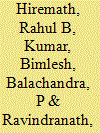| Srl | Item |
| 1 |
ID:
094244


|
|
|
|
|
| Publication |
2010.
|
| Summary/Abstract |
Decentralized Energy Planning (DEP) is one of the options to meet the rural and small-scale energy needs in a reliable, affordable and environmentally sustainable way. The main aspect of the energy planning at decentralized level would be to prepare an area-based DEP to meet energy needs and development of alternate energy sources at least-cost to the economy and environment. Present work uses goal-programming method in order to analyze the DEP through bottom-up approach. This approach includes planning from the lowest scale of Tumkur district in India. The scale of analysis included village level-Ungra, panchayat level (local council)-Yedavani, block level-Kunigal and district level-Tumkur. The approach adopted was bottom-up (village to district) to allow a detailed description of energy services and the resulting demand for energy forms and supply technologies. Different scenarios are considered at four decentralized scales for the year 2005 and are developed and analyzed for the year 2020. Decentralized bioenergy system for producing biogas and electricity, using local biomass resources, are shown to promote development compared to other renewables. This is because, apart from meeting energy needs, multiple goals could be achieved such as self-reliance, local employment, and land reclamation apart from CO2 emissions reduction.
|
|
|
|
|
|
|
|
|
|
|
|
|
|
|
|
| 2 |
ID:
112258


|
|
|
|
|
| Publication |
2012.
|
| Summary/Abstract |
Sustainable development has become an important part of international and national approaches to integrate economic, environmental, social and ethical considerations so that a good quality of life can be enjoyed by current and future generations for as long as possible. However, nowadays sustainable development is threatened by industrial pollution emissions which cause serious environmental problems. Due to a lack of adequate quantitative models for environmental policy analysis, there is a strong need for analytical models in order to know the effects of environmental policies. In the present paper, a goal programming model, based on an environmental/input-output linear programming model, is developed and applied to the Spanish economy. The model combines relations between economic, energy, social and environmental effects, providing valuable information for policy-makers in order to define and examine the different goals that must be implemented to reach sustainability.
|
|
|
|
|
|
|
|
|
|
|
|
|
|
|
|